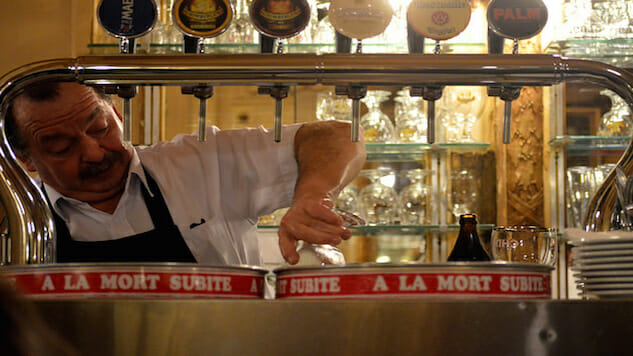
The recent online campaign to save the oldest bar in the German capital—Brecht’s favored local, the Alt Berlin, reopened in 2016—highlights a communal reverence for drinking houses with a bit of history. After all, what’s Europe if not history? Inns, taverns and alehouses dating back nearly a millennium can be found in dark corners of London and all around the historic heart of Central Europe.
Given these establishments may have served some of the most notable cultural heavyweights in Western civilization, ordering a standard, everyday branded beer from a corporate multinational doesn’t quite cut the mustard. So, as you’re raising a glass to Shakespeare, Beethoven or Brecht, here are some tips as to the most suitable ale for the occasion.
Prague
As tick-listed as the Charles Bridge, Kafka’s Castle and the Astronomical Clock in Prague’s must-sees, U Fleku opened in the last year of the Middle Ages, 1499. The Knights’ Hall, the Wenceslas Hall, the Old Bohemian Hall, minstrels might still be seen a-strumming around this 1,200-capacity medieval complex. The house beer is almost as venerable. The strong, dark Flekovsky ležák was created in 1843 and will be plonked in front of you until a beermat over the glass tells the waiter to stop.
The history of the beer that flows and flows in famed literary pub U Zlatého tygra is almost as colorful as its golden hue. Pilsner Urquell was the world’s first lager, created in 1842 by a Bavarian specialist. Few sank as much of it as writer Bohumil Hrabal, a lifelong regular at this 18th-century beerhall, who raised glasses here with Václav Havel and other leaders of the post-Communist world.
England
Considered the oldest hostelry in merry England still in operation, Nottingham’s Ye Olde Trip to Jerusalem opened the same year that Richard the Lionheart was crowned king: 1189. A statue of his admirer and contemporary, Robin Hood, stands outside.
Though always awash with tourists, ducking their heads in its cellars as they wander around its medieval cock-fighting pits, this is no tourist trap. YOTJ is also an outlet for Nottingham Brewery, itself dating back to 1847. Ales change daily—one time ruby-colored Dreadnought, the next Rock Bitter, its recipe created in the 1800s—but you can count on house Olde Trip, specially commissioned from the same producers.
London can’t match Nottingham’s longevity—so many of its pubs were lost in the Great Fire of 1666. Diarist Samuel Pepys watched the flames roar from The Anchor, by The Globe theatre. Shakespeare drank at this same site when it was a pub-cum-bear-bating pit. A suitable beer here might be the 1730 Ale that marks the foundation of house brewery Taylor Walker.
Berlin
Considered the oldest bar in the German capital, Alt Berlin opened in 1893 and could number Bertolt Brecht among its regulars. This classic Kneipe survived two World Wars and the Socialist rebuild of East Berlin, but not the post-Communist gentrification of city-centre district Mitte. Known as Heinz and Inge after its former owners and sign over the door, the Alt Berlin was due for closure when a campaign to save it made regular news in the local press. Former customers Bowie and Tarantino were contacted, to no avail.
In stepped another regular, Christof Blaesius, owner of the century-old Ballhaus Berlin ballroom on Chausseestrasse. Having packed up every sign and stick of furniture, including the wooden bar counter, he had his team rebuild the Alt Berlin in his inner courtyard and invited old staff and city luminaries to its grand opening in 2016.
On tap here is Schultheiss, produced by the Berlin brewery who lay on tours of their 19th-century premises three times a day.
Vienna
One of Vienna’s oldest inns, the 15th-century Griechenbeisl has served the likes of Beethoven and Brahms, Schubert and Strauss. Handwritings by Mark Twain line the room named after him, one of several that comprise this ivy-clad landmark on Fleischmarkt. Greeks have lived in this historic part of the Austrian capital for centuries—next door is the Greek Orthodox Church.
This being Vienna, wine is the tipple here, but annually produced beer vintages also feature. Unique in Europe, Reininghaus Jahrgangs Pils is brewed with every year’s hop harvest at Leutschach in southern Styria, hence the date on the beer taps.
Its origins dating back even further—although what you see today is a 1561 rebuild—the Zwölf Apostelkeller is another of Vienna’s venerable venues. Wiener Original beer is the most suitable choice here, produced by the local Ottakringer stable according to a century-old recipe.
Brussels
The Belgian capital is awash with age-old bars serving revered beers. The Surrealist regulars of a century ago, Magritte, Scutenaire and Lecomte, would still recognize La Fleur en Papier Doré today, its bizarre trinkets and junk-shop finds. The Gueuze beer it serves is still made by traditional methods across town in Anderlecht, naturally fermented and poured from champagne bottles.
Now run by the fourth generation of the Vossen family, A La Mort Subite (‘Sudden Death’) is named after a popular card game from the late 1800s and not the formidably strong house beer that comes on draught. Capable of delivering the most pitiful of hangovers, this white Lambic beer is presented in its own glass and on its own beermat, amid lived-in wood, plentiful mirrors and framed images from fin-de-siècle Brussels.
Main photo courtesy of Bill Smith/Flickr CC BY 2.0
Lead photo courtesy of David Merett/ Flickr CC BY 2.0
Budapest-based Peterjon Cresswell is responsible for Libero, a global travel guide for soccer fans.